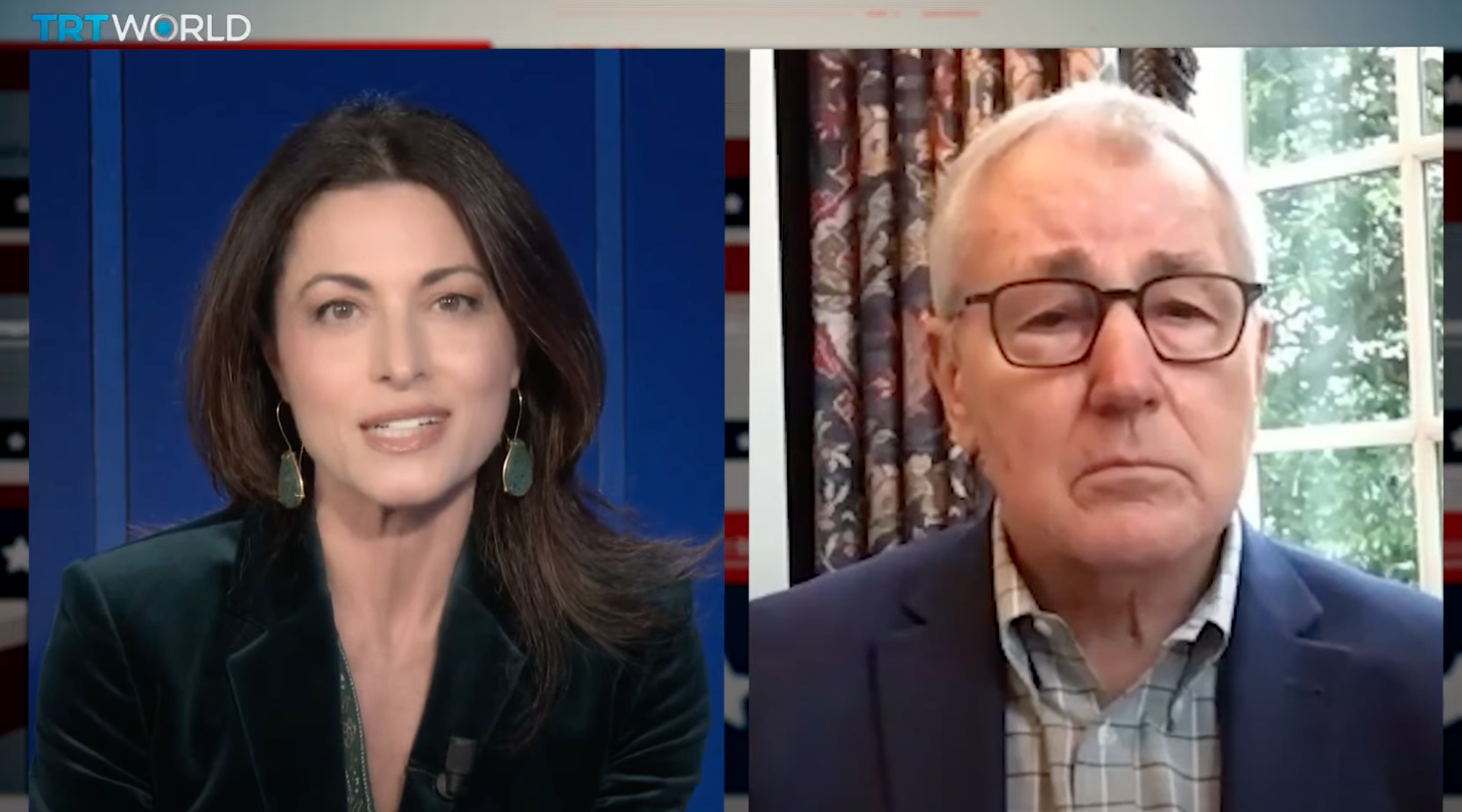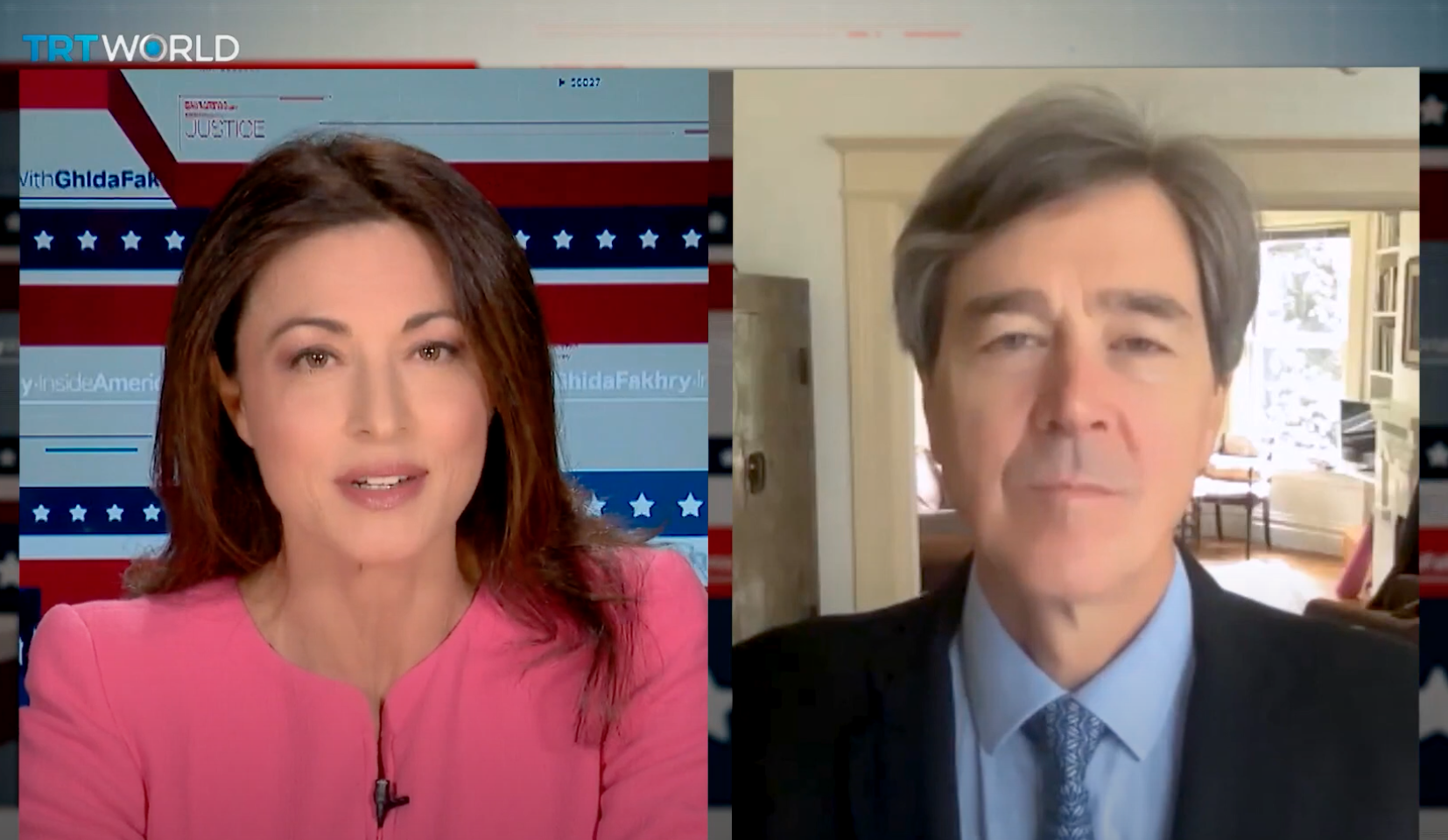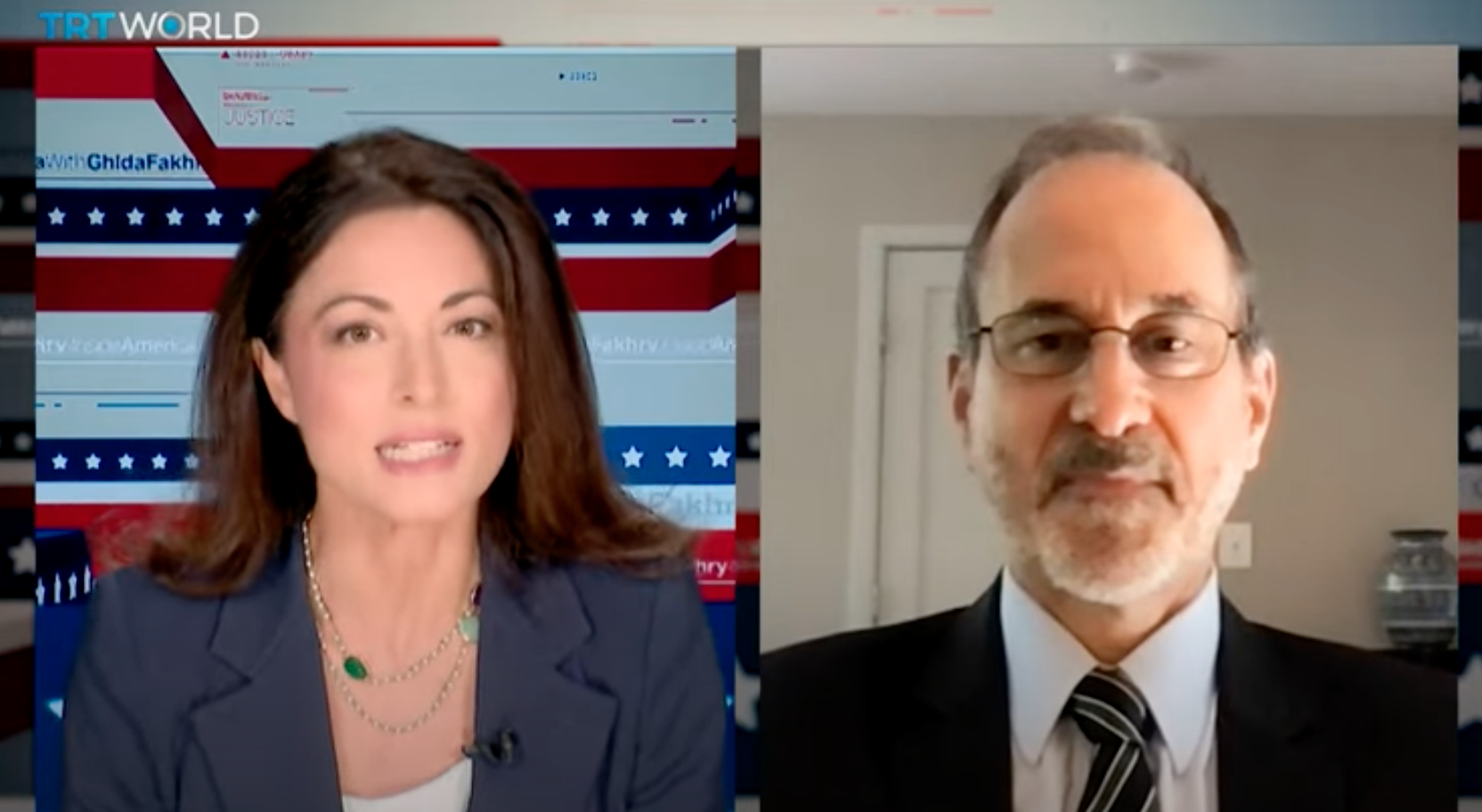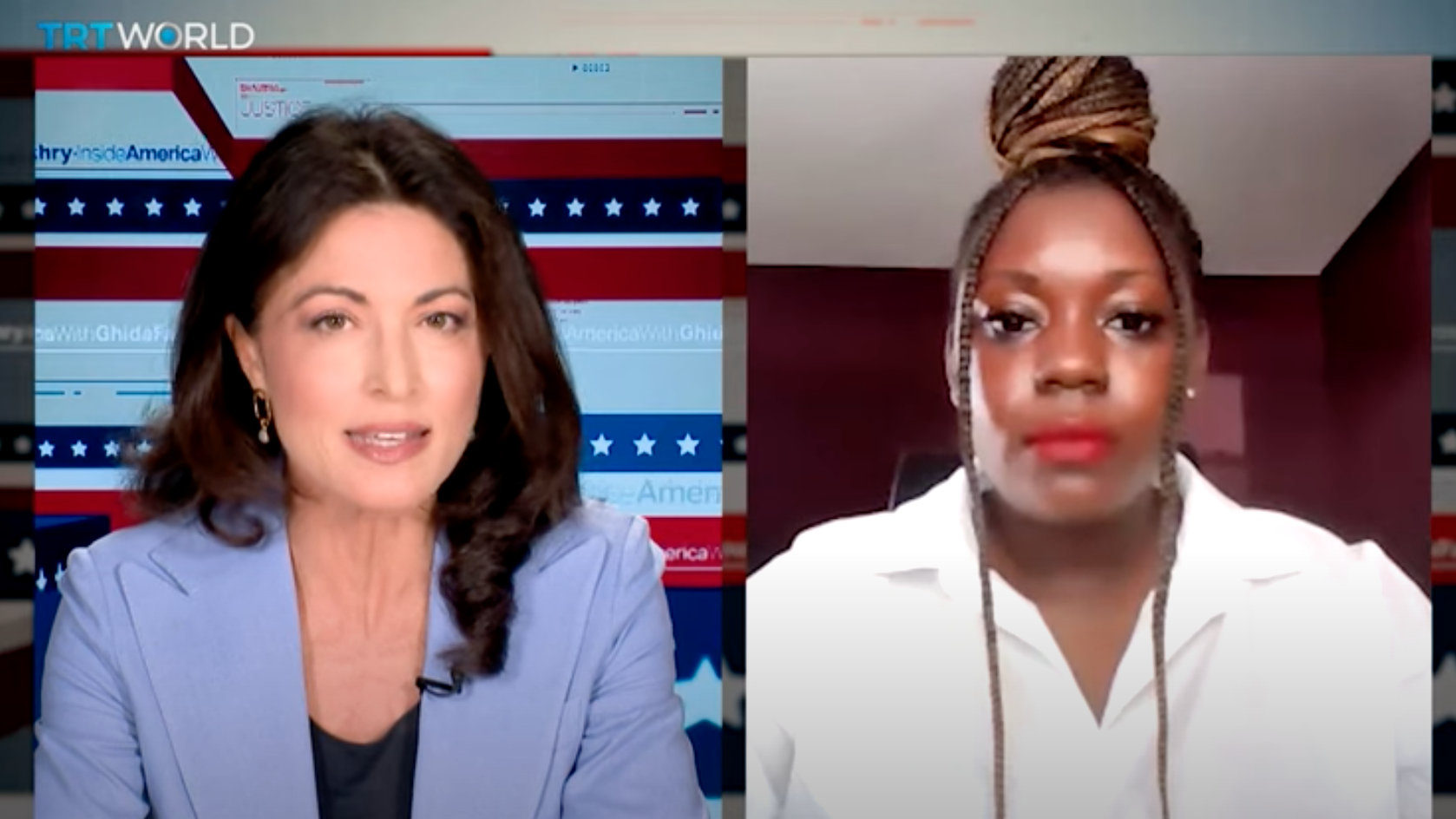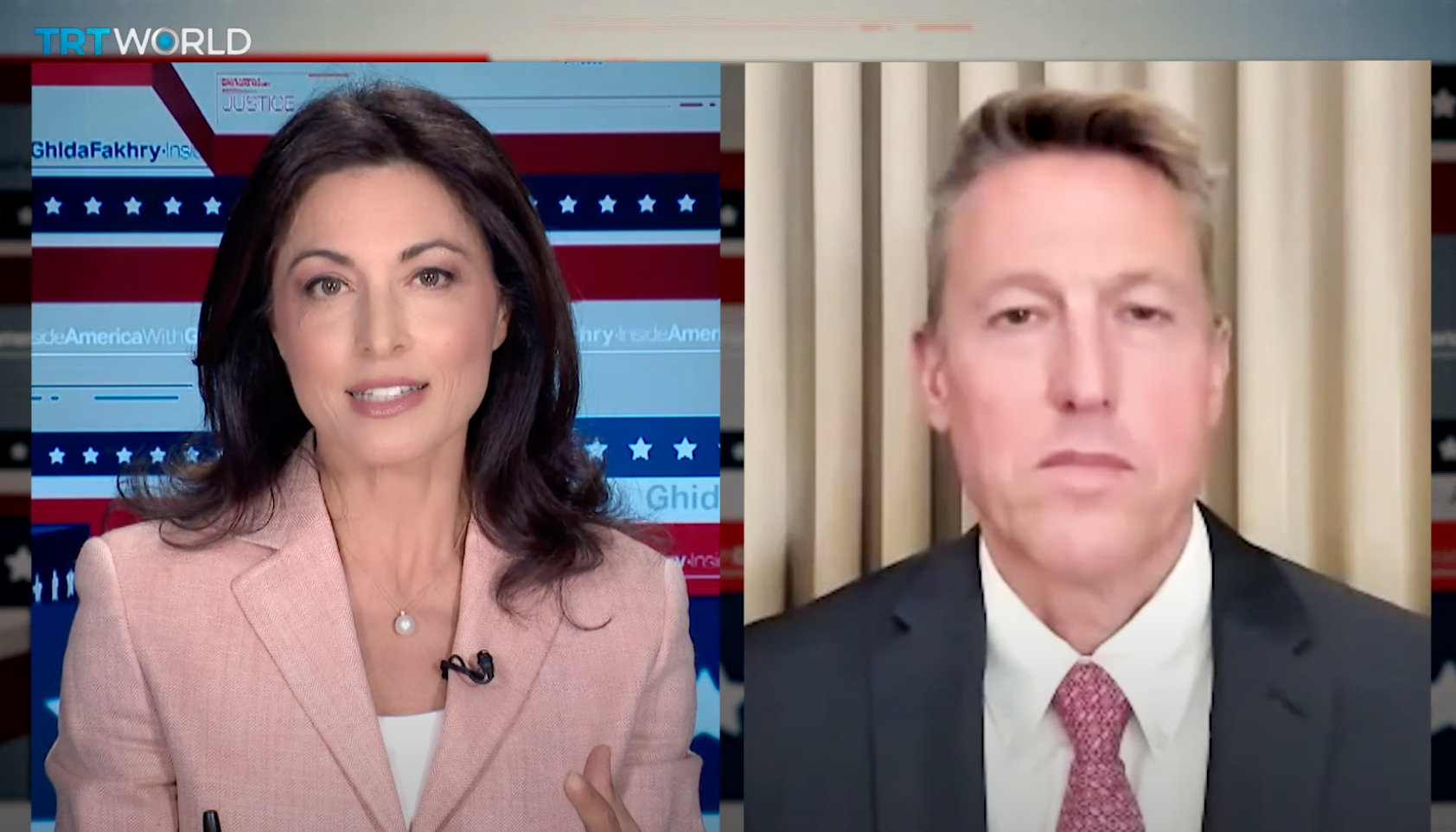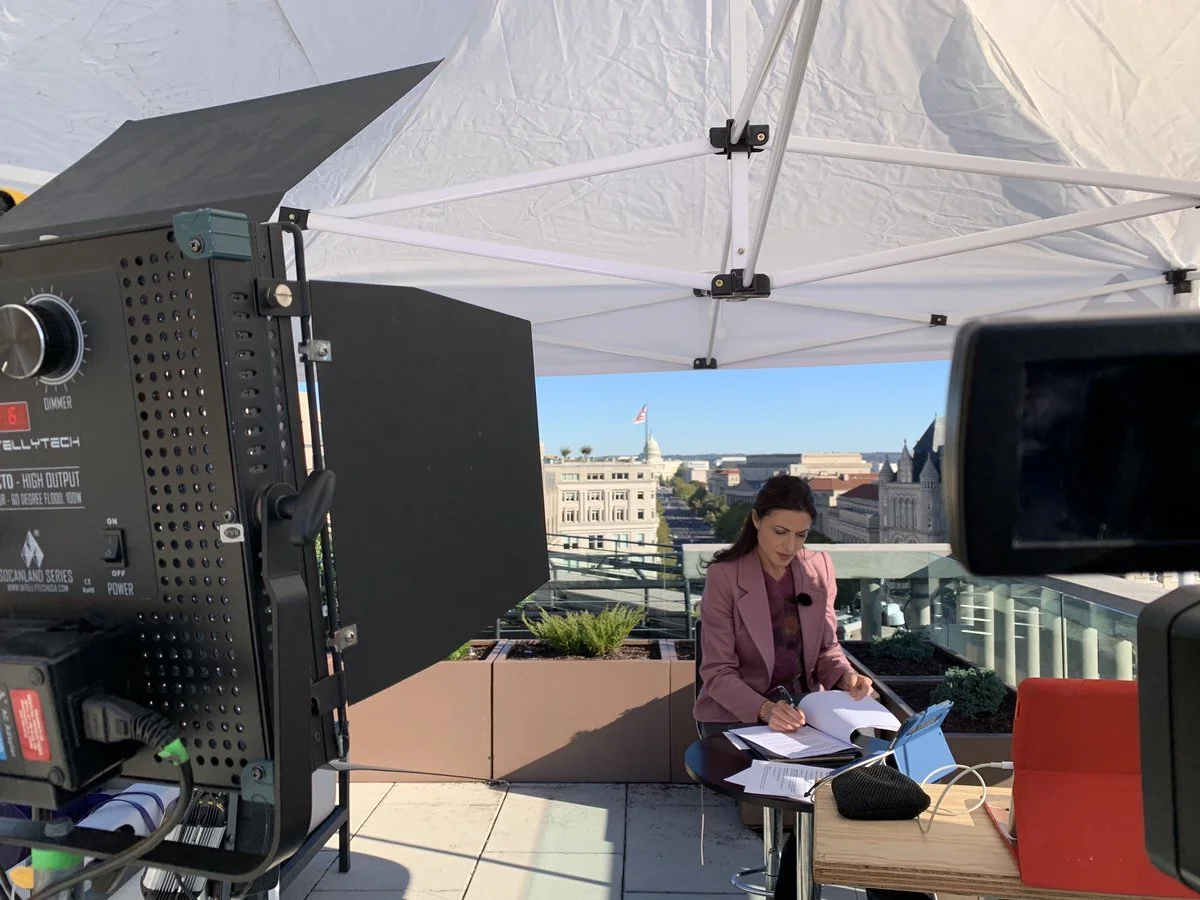Ghida Fakhry is Host and Executive Producer of TRT World’s flagship political program from Washington DC, “Inside America with Ghida Fakhry,” which premiered on 29 April 2020. The weekly program airs Wednesdays at 18:30 GMT/2:30 EST.
Through in-depth interviews with American officials and policy-makers and sharp analysis with opinion leaders, “Inside America with Ghida Fakhry” explores issues shaping US politics.
The program breaks down the week’s major headlines and uncovers some of the underreported stories across the United States, with hard-hitting interviews with US officials and decision-makers.
Episodes also available on Apple Podcasts here
Iraq: 20 Years on — Part 2
March 29, 2023
Twenty years ago, this month, the US invaded Iraq with 130,000 combat troops and a terrifying air campaign — shock and awe. Last month President Biden declared in Warsaw: “The idea that over 100,000 forces would invade another country —since World War II, nothing like that has happened.” Two decades after the Iraq war, no regret, no apology —and no accountability for what Noam Chomsky says was “a textbook example of what was called at the Nuremberg Tribunal ‘the supreme international crime of aggression’.” In Part 2 of “Iraq: 20 Year on”, I speak with a Pentagon whistleblower and a top advisor to US Vice President Cheney, one of the war’s key architects.
Iraq: 20 Years On — Part 1
March 23, 2023
Twenty years ago, this week, the US invaded Iraq with devastating consequences for the country and the region. We look at the legacy of the war — its human cost and long-lasting legal and political ramifications. To date, no US or British official has apologised, let alone been held to account for launching a war that then-UN Secretary General Kofi Annan called ‘illegal’. I speak with the first Prosecutor of the International Criminal Court and ask him if Iraq did not deserve international justice, and whether the ICC’s arrest warrant for President Putin on the eve of the 20th anniversary of the Iraq invasion did not show the politicization of the Court.
A Looming Indictment?
March 16, 2023
Prosecutors in New York move closer to a possible indictment of Donald Trump as he refuses to testify this week before a grand jury. Trump could become the first former president in US history to be indicted, following the decision by the Manhattan District Attorney to invite him to testify this week over an alleged hush-money payment and falsification of payment records, in the lead-up to the 2016 election. Trump, who is running for president for a third time, called it a “political Witch-Hunt”, saying the aim is to “take down the leading candidate, by far, in the Republican Party”.
Banning TikTok
March 9, 2023
New legislation to ban TikTok moves through the US Congress, as lawmakers accuse the Chinese social media app of threatening US national security, while civil liberties activists warn the move could violate the constitutional rights of millions of Americans. TikTok, which is used by over 100 million Americans, including two thirds of American teenagers, has been called a “security threat” by Republican lawmakers on Capitol Hill and top US intelligence officials.
The Opioid Crisis
March 1, 2023
President Biden is calling on Congress to tackle America’s opioid crisis, as fentanyl-related deaths in the US surge to more than 70,000 a year. Republican lawmakers are blaming the Biden administration for not doing enough to curb the production, sale and trafficking of this lethal synthetic opioid at the US’ southern border. Mexican drug cartels are increasingly manufacturing fentanyl for the US market, using chemicals imported predominantly from China.
Seymour Hersh on Nord Stream
February 22, 2023
The US government rejects a bombshell report by Pulitzer Prize veteran investigative journalist Seymour Hersh entitled “How America Took Out the Nord Stream Pipeline”, which alleges that the United States, with Norway’s assistance, blew up the Nord Stream 1 and 2 natural gas pipelines in a covert operation last September. The attack on the Nord Stream pipelines was carried out by the US Navy and the CIA under direct orders from President Biden, according to Hersh’s piece which was published on February 8th on Substack.com. Seymour Hersh joins Ghida Fakhry on this week’s episode to discuss his report.
Chasing a Chinese Balloon
February 8, 2023
President Biden’s decision earlier this month to shoot down what the US says was a Chinese spy balloon flying in US airspace to gather sensitive military information, and what Beijing maintains was an unmanned civilian balloon used for weather data gathering, was met with accusations and warnings of ‘further responses’ by China —as diplomatic tensions between the two countries flared. The balloon which was first detected over Alaskan airspace on January 28th, was shot down by US fighter jets on February 4th.
Tanks for Ukraine
February 1, 2023
As Ukraine pleads for more heavy weapons, the US considers the scope of its military assistance following President Biden’s decision last week to supply Kiev with 31 Abrams tanks. This move by the White House marks a reversal in the US’ earlier decision not to send one of its most advanced offensive weapons used in ground combat to the Ukrainian government and could lead to a new escalation in the conflict.
Interview with Trump’s Secretary of Defense Mark Esper
January 25, 2023
He was Trump’s Secretary of Defense, during 18 months of heightened political tensions in the United States. He was fired, by tweet, just days after Trump lost the 2020 election. On today’s program, Mark Esper joins me to discuss his new book ‘A Sacred Oath: Memoirs of a Secretary of Defense During Extraordinary Times’.
Resetting US-Africa Relations
December 21, 2022
With almost 50 African leaders gathered in Washington last week, the Biden administration promised to invest billions of dollars in their countries’ economies in an effort to reset US-Africa relations. But after years of tense relations and neglect, can Washington sway African leaders with $55 billion of economic, health, and security support over the next three years? How will America’s rivalry with China and Russia shape US-Africa relations, and can Africa leverage its growing economic potential?
Easing Sanctions on Venezuela’s Oil
December 7, 2022
The Biden administration eases some sanctions on Caracas, allowing oil giant Chevron to start producing and shipping Venezuelan oil to the United States. Chevron, the second-largest US oil company, is expected to begin shipping oil from Venezuela to the United States later this month, following the Biden administration’s decision to ease some of the sanctions imposed on the Venezuelan government.
A Generational Shift
November 30, 2022
As Democrats in Congress hold their leadership election this week, two of the top three positions will go to the next generation of Democrats. Earlier this month, Nancy Pelosi, the 82-year-old Speaker of the House of Representatives, announced that she will step down as the top House Democrat after nearly two decades in leadership positions. Her decision, which comes after her party lost its majority in the House in the midterms, paved the way for 52-year-old Congressman Hakeem Jeffries to become the first Black house minority leader. As the Democratic Party leadership undergoes a generational shift, Joe Biden who turned 80 last week became the first octogenarian president of the United States.
Twitter and Free Speech
November 23, 2022
Since his takeover of Twitter late last month, Elon Musk has faced growing criticism. Last week, he reversed Twitter’s decision in 2021 to ‘permanently suspend’ Donald Trump’s account following the January 6th insurrection ‘due to the risk of further incitement of violence’. Does the decision to reinstate Trump’s Twitter account amount to a reckless move by the company’s new CEO, as some Democratic lawmakers and civil rights organizations argue —or does it represent a victory for free speech?
Republicans in Limbo
November 16, 2022
As Donald Trump announced that he is running for president in 2024, the Republican leadership in the US Congress continued to grapple with the results of the midterm elections —with Democrats retaining control of the Senate and Republicans expected to gain a very slim majority in the House of Representatives. While some Republicans blamed Trump for their poor performance in the midterms, the former president refused to accept any responsibility and vowed to “make America great and glorious again”
Democracy on the Ballot
November 9, 2022
Millions of Americans voted in the midterms on Tuesday, to elect all 435 members of the House of Representatives and over a third of the 100 members of the Senate. President Biden called the election “a defining moment” for the United States, warning that democracy itself was on the ballot and that the US could be “on a path to chaos” if Republican candidates refuse to accept the election results —as law enforcement agencies forecast a rise in threats posed by domestic violent extremists.
Israel’s “Crime of Aggression”
November 2, 2022
The US shields Israel from renewed international scrutiny and criticism after several UN Special Rapporteurs highlight in their latest reports to the UN General Assembly the growing consensus over Israel’s apartheid policies in the Occupied Palestinians Territories.
Cross-border Politics
October 26, 2022
As Republican governors from southern states defend their policies to bus and fly thousands of migrants to Democratic-run cities, including the nation’s capital Washington DC, Democrats accuse them of political stunts — less than two weeks before midterm elections that will determine which party controls the US Congress.
The Price of Oil
October 19, 2022
Joe Biden threatens to take action against Saudi Arabia, as Democrats in the US Congress warn Riyadh to change course or face a freeze on all US arms sales following the recent decision by OPEC+ to cut oil production —raising gas prices just weeks before crucial midterm elections.
Sabotaging Nord Stream
October 12, 2022
An explosion that damaged a gas pipeline in the Baltic Sea raises questions about possible US covert action against Russia and prompts accusations — without evidence — from all sides.
World Bank Under Fire
October 5, 2022
The president of the World Bank faces mounting pressure to resign amid accusations of climate change denial, as members of Congress call for his immediate removal from office.
Trump Org in Peril
September 28, 2022
Donald Trump has faced countless lawsuits over the past three decades. There have been reportedly thousands of legal actions involving Trump and his businesses, in federal and state courts, ranging from real estate to personal defamation lawsuits. Last week, the Attorney General of the State of New York brought new charges against the former president and three of his children, alleging massive fraud.
UNGA 77
September 21, 2022
As world leaders convene in New York for the 77th United Nations general assembly, the ongoing war in Ukraine is likely to be at the fore. But will any progress be made?
The 'Special Relationship’
September 14, 2022
Since World War II, the US and the UK have enjoyed what Winston Churchill labeled a ‘special’ relationship. Could the end of the Queen’s decades-old reign which cemented the special relationship, bring about change between the two allies?
Trump, Politics and Prosecution
September 7, 2022
As the US Department of Justice considers its next move in the criminal investigation involving the former president, Joe Biden and Donald Trump continue to trade accusations as tensions run high.
Dire Straits of Taiwan
August 10, 2022
Despite warnings from both members of the US government and foreign leaders that such a move would be ‘provocative,’ House speaker Nancy Pelosi included Taiwan on a visit to Asian countries last week to reaffirm the US relationship with the country.
Indicting a Former President
August 3, 2022
Donald Trump returned to Washington last week for the first time since he left office, as the Justice Department’s criminal investigation into the attack on the US Capitol now looks at Trump’s actions and the extent of his involvement in trying to overturn the 2020 election results.
The 'Clear and Present' Climate Danger
July 27, 2022
Faced with roadblocks in the US Congress and record-high temperatures in much of the United States, President Biden signaled his willingness last week to invoke emergency powers to address the climate crisis.
Biden's Middle East Gamble
July 20, 2022
Joe Biden’s four-day trip to Israel and Saudi Arabia last week has been widely criticized in the US for failing to achieve its objectives, as the President continued to face questions about what his visit had accomplished.
America’s Food Insecurity
July 6, 2022
According to the US Department of Agriculture, more than 1 in 10 US households are food insecure. Other data shows that 1 in 8 Americans experience food insecurity. The problem was made worse by the COVID-19 pandemic and rising inflation which soared to a 40-year high of 8.5% in March.
The Court v. The People
June 29, 2022
Two rulings last week by the US Supreme Court one overturning a 50-year-old court decision that guaranteed a woman’s national right to terminate a pregnancy, the other expanding the right to bear arms have thrown America’s growing divisions into sharp relief, calling into question whether the Court truly represents public opinion in the US.
Juneteenth: The Legacy of Slavery
June 22, 2022
While the US marks Juneteenth, a federal holiday to commemorate the end of slavery in the United States, racial disparities and the struggle for justice in America continues
Shifting Sands in the Americas
June 16, 2022
Boycotts and a public outcry over the Biden administration’s decision to exclude Cuba, Venezuela and Nicaragua from the Summit of the Americas, amid growing signs of the United States’ waning influence and regional decline.
US Forces in Somalia
June 8, 2022
Washington deploys hundreds of US troops to Somalia and targets Al Shabab militants amid concerns over the goals and effectiveness of the Biden Administration’s strategy in the Horn of Africa.
‘Operation Fly Formula’
June 2, 2022
The Biden administration airlifts over a million baby formula bottles from Europe as it struggles to fill a nationwide shortage, amid a growing political and public health crisis and calls to address the systemic issues that caused the shortage in the first place.
America’s Border Politics
May 25, 2022
A public health order known as Title 42 will continue to be used by US law enforcement to expel migrants at the southern border, following a court ruling last week that blocked the Biden administration’s attempts to lift the restrictions imposed by the Trump administration at the beginning of the pandemic.
Demanding Accountability
May 19, 2022
Shock, condemnation and calls for an independent investigation into the killing of a Palestinian-American journalist — as some members of Congress urge the Biden administration to hold Israel accountable.
Overturning Roe v Wade
May 12, 2022
With the US Supreme Court set to overturn Roe v Wade, a landmark ruling that legalized abortion across the United States fifty years ago, activists and lawmakers on both sides get ready for what comes next.
Investigating Trump
May 5, 2022
A special grand jury has been selected to look into Donald Trump’s alleged election interference in Georgia, as another grand jury in New York ends its investigation into the former president’s business practices — with no indictment.
The US and the ICC
April 20, 2022
As President Biden calls for an investigation into Russia’s military campaign in Ukraine which he called “genocide," some US lawmakers say the United States must join the International Criminal Court if it is serious about making Russia accountable under international law.
Judging an Insurrection
April 12, 2022
The US Attorney General faces mounting pressure by Democrats in Congress who say there is now sufficient evidence for the Justice Department to bring criminal charges against former President Donald Trump for his role in last year’s insurgency at the US Capitol.
Boycotting Russian Oil and Gas
April 6, 2022
As the price of gas at the pump reaches near record-highs in the US, President Biden announces the release of oil reserves to appease global oil markets and limit the political fallout of higher energy prices as the crisis with Russia escalates.
Proxy War and Peace in Ukraine
March 31, 2022
With around 10% of Ukraine’s population becoming refugees in a month, and 25% internally displaced, the conflict enters its second month with no quick end in sight. But with President Biden calling his Russian counterpart a “butcher” who “cannot remain in power," has the Russia-Ukraine conflict become even more a US-Russian proxy war?
NATO and the Ukraine Crisis
March 9, 2022
As the crisis in and over Ukraine deepens, its humanitarian effects widen, and its economic fallout spreads across the world.
US Gunmakers Under Pressure
February 24, 2022
It has been 10 years since a gunman, armed with a Remington assault rifle, murdered his mother and 20 elementary school children in Connecticut. Now an unprecedented $73 million ruling against Remington, the oldest gun manufacturer in the US, could end the industry’s longstanding immunity.
Cuba Embargo at 60
February 16, 2022
Sixty years ago this month, the United States imposed an embargo on all trade with Cuba to punish the communist government of Fidel Castro and force regime change. Despite a campaign promise to re-engage and lift some restrictions, the Biden administration has imposed more sanctions on Cuba.
Targeting Nord Stream 2
February 9, 2022
As the US deploys additional troops in Poland and Romania amid Russia’s troop deployment along its border with Ukraine, the political stand-off, and a dangerous warmongering rhetoric between Washington and Moscow hides a lingering strategic issue for both countries: Nord Stream 2, an undersea gas pipeline expected to increase Russian gas exports, bypassing Ukraine. It is a major energy project that Washington has tried to derail for years.
Whose Supreme Court?
February 2, 2022
US Supreme Court justices are appointed for life, but occasionally they decide to step down. Last week, justice Stephen Breyer announced his retirement after 28 years on the bench, giving a Democratic president the first opportunity to appoint a judge to the court since 2016, when president Barack Obama’s attempt to fill a vacancy left by the passing of justice Antonin Scalia was blocked by Republicans.
Crisis Over Ukraine
January 26, 2022
The US and UK accuse Russia of planning further military incursions into Ukraine — but has NATO provoked the current crisis?
Biden: One Year On
January 19, 2022
One year into his presidency, is Joe Biden delivering on his electoral promises to the American people?
One Year After the Insurrection
January 5, 2022
A year after the insurrection on the US capitol in Washington, what is the state of American democracy?
The US Defence Business
December 22, 2021
The United States has had, over the last seventy-five years, the largest defense budget in the world. And it keeps growing. Last week, the US Senate passed the largest military-spending bill since World War Two.
In Conversation With Cornel West: Part Two
December 15, 2021
A political activist, professor, writer and philosopher. Part Two of our conversation with one of America’s foremost public intellectuals, Dr Cornel West.
In Conversation with Cornel West: Part One
December 8, 2021
A political activist, professor, writer and philosopher. We speak to one of America’s foremost public intellectuals, Dr Cornel West.
The Colour of Justice
December 1, 2021
The trials of Kyle Rittenhouse and Ahmaud Arbery’s killers have reignited debates across the United States about racial disparities in America’s criminal justice system and whether it ought to be reformed, especially in respect of self-defense.
The Trump Equation
November 24, 2021
Republican Senate Minority leader Mitch McConnell is predicting that his party will have “very good” results in next year’s midterm elections and could possibly win both the House and Senate. The Republican confidence about the midterms was reflected in a recent survey released earlier this month which showed Republicans leading Democrats by 10 points —51% to 41%— in the 2022 generic congressional ballot. That is the largest margin in the 40-year history of the survey. Other recent polls show that more Americans want to see the Republican Party take control of the House and Senate next year. But one central —and sensitive— issue that confronts and divides Republicans is Donald Trump. The former president who has recently signaled a possible presidential run in 2024, has been holding rallies and raising large sums of money. He remains a strong voice, and at the core of the Grand Old Party’s internal politics. His favorability rating among Republican voters stands at 86%. Just 10% hold an unfavorable view of the former President [poll]. So given Trump’s continuing popularity with the base of the party, what should the strategy of the wider Republican Party be?
The Pharma Industrial Complex
November 17, 2021
It is one of the key provisions in President Biden’s Build Back Better legislation, which is expected to be voted on this week in the House of Representatives, and something Democrats have been working on for several decades: how to regulate and lower the price of prescription medication in the United States. Earlier this month, Congressional Democrats managed to revise and save a reform proposal on prescription drugs that was originally dropped from the Build Back Better Act, Biden’s wide-ranging social spending bill. Under the new plan, the US government would negotiate the cost of 10 drugs starting in 2025, and Pharmaceutical companies would be penalized for price hikes exceeding the inflation rates. The original plan to allow the government to negotiate the price of, first, 25, and then 50 prescription drugs, would have saved, according to the White House, $450 billion over ten years; under the agreed plan, those savings will amount to $250 billion.
Parties Under Pressure
November 10, 2021
Brad Raffensberger, Georgia’s Republican Secretary of State, was the target of one of President Trump’s efforts to question the fairness and integrity of Georgia’s election count. In his new book, “Integrity Counts”, Brad Raffensperger, a lifelong Republican, speaks out against Trump’s claims of voter fraud in the 2020 election, and blames both parties for undermining trust in the democratic process. Also on this show: With just under a year until the critical mid-term elections in November 2022 , Republicans and Democrats are focusing their attention on the crucial forthcoming congressional, gubernatorial, state and local elections. All 435 seats in the House of Representatives and 34 of 100 seats in the Senate are up for grabs. As it stands today, the Senate is split 50/50 with Vice President Kamala Harris, the President of the US Senate, holding the deciding vote.
Climate COP Out
November 3, 2021
Attending the first Conference of the Parties since the US returned to the 2015 Paris Agreement, President Biden joined other heads of state and government meeting at COP26 in Scotland this week —calling the need for urgent climate action both a moral and economic imperative. There is growing pressure on the US and the world’s other major industrialized nations, the G20, which are responsible for 80% of global greenhouse gas emissions, to do more. This follows a stark warning from the UN Secretary General who described the latest report from the Intergovernmental Panel of Climate Change (IPCC) as a “code red for humanity”, with scientists warning that global temperatures were projected to rise beyond the 1,5 degree Celsius goal set in Paris, largely due to fossil fuels. And while President Biden reiterated his administration’s commitment to cutting emissions by 50% from 2005 levels, by 2030, he faces significant challenges on Capitol Hill to enact his proposed $1.7 trillion social spending legislation which includes 555 billion dollars in climate-related spending —the oil and gas industry would be forced to share the cost by raising more than $100 billion dollars from fossil fuel firms over the next decade.
The Great Resignation
October 27, 2021
A record-breaking 4.3 million people in the United States have quit their jobs in the month of August alone according to data released by the US Bureau of Labor Statistics. That’s 2.9 % of the total workforce. The month before that, 4.1 million Workers resigned. These are the highest numbers ever reported by the Bureau of Labor Statistics. Experts who have called this “The Great Resignation”, say people are leaving their jobs because workers across the US are demanding better pay and working conditions as well as more flexibility in their daily lives. A new poll found that since the COVID-19 pandemic began, 91 percent of Americans want to do at least some of their work from home. States such as Kentucky, Idaho, South Dakota and Iowa have the highest rates of workers quitting their jobs. They also have higher rates of new COVID-19 infections. So what are the driving forces behind the “Great Resignation”?
Powell's Legacy and GITMO
October 20, 2021
The passing on Monday of General Colin Powell, an icon of US military and political life, revered by Republicans and Democrats alike, and whose illustrious career at the service of both Republican and Democratic Presidents is quite uncommon, has reignited the debate over Powell’s responsibility in making the case for war in Iraq, internationally, and to the American people. One issue Powell was particularly critical of, over the last few years, was the US military prison at Guantanamo Bay. He criticized the Bush administration’s treatment of detainees and called for closing the military detention facility, saying it would be in the “best interest” of the US to do so. Asked earlier this year if President Biden would shut the prison at Guantanamo by the time his presidency ends, White House spokeswoman Jen Psaki told reporters: “That certainly is our goal and our intention.” Meanwhile, the Biden Administration has told the US Supreme Court that it will allow Abu Zubaydah, a Guantanamo detainee who has never been charged, to present limited testimony about his alleged torture by the CIA. Earlier this month, the Supreme Court began hearing arguments in Abu Zubaydah’s case to determine if testimony from CIA agents and contractors who oversaw his torture, can be subpoenaed.
The First Americans
October 13, 2021
Joe Biden has become the first sitting US president to issue a proclamation commemorating Indigenous People’s Day, which has traditionally been marked across the United States as Columbus Day, honoring Christopher Columbus, the explorer, who was also a brutal colonialist. In the proclamation issued by the White House, Biden described the contributions of Indigenous peoples throughout history as an “integral” part of the American nation, culture and society, while acknowledging “the significant sacrifices made by native peoples”.
Afghan Refugees in Limbo
October 6, 2021
During a politically charged hearing before the Senate Armed Services Committee last week, with Republicans seeking to place the blame for the fallout on president Biden, and Democrats pointing to ill-advised decisions by President Trump, the Chairman of the Joint Chiefs of Staff Gen. Mark Milley and the head of US Central Command Gen. Kenneth McKenzie told Congress that they had advised President Biden against a full withdrawal and recommended keeping a military presence in Afghanistan. Defense Secretary Lloyd Austin testified that he agreed with McKenzie's analysis. He added that the Doha agreement also committed the United States to ending airstrikes against the Taliban. Last week’s House and Senate hearings marked the start of what is likely to be an extended congressional review of US failings in Afghanistan, especially after years of limited congressional oversight of a war that ended up costing American taxpayers $2.3 trillion dollars. As many as 14,000 Afghan evacuees are expected to begin arriving in the US this week on humanitarian parole, a process by which they are allowed to enter the US without visas. While humanitarian parolees could stay and work in the US temporarily, they are not eligible for the same resettlement services extended to refugees, such as federal cash assistance
The AUKUS Pandora's Box
September 29, 2021
Diplomatic relations between the US and France hit an all-time low earlier this month following the announcement of a strategic defense agreement known as AUKUS —between Australia, the UK, and US—that provides for the sale of nuclear-powered submarines to Australia. The agreement, which led Australia to scrap a $66 billion dollar deal with France for the delivery of diesel-electric attack submarines initiated in 2016, provoked a rift between the transatlantic allies. AUKUS, largely seen as a strategic alliance to contain China’s growing air and sea power, drew a sharp rebuke from Beijing, which characterized the agreement as a step towards a new cold war and criticized Washington’s decision to export its weapons-grade naval nuclear technology to a non-nuclear-weapon state as a violation of the Non-Proliferation Treaty (NPT). The transfer of Highly Enriched Uranium —at over 90% enrichment levels— foreseen in the AUKUS agreement, would be a first and raises serious concerns from a non-proliferation standpoint, not only in Beijing. So, is AUKUS opening Pandora’s box?
The UN’s Taliban Gambit
September 23, 2021
At the UN’s annual General Assembly meetings this week there has been a renewed call for upholding the values and principles the UN was founded on 76 years ago: peace, justice, equality and human rights. Nowhere more so than in Afghanistan, where the UN has warned that the country is facing one of its most perilous hours. The country had been facing a humanitarian crisis for years despite 2 decades of heavy American, NATO and UN involvement. How should the UN respond to Afghan’s humanitarian and economic needs at this critical moment? And will member states engage with the Taliban? Zeid Ra’ad Al Hussein, the former UN High Commissioner for Human Rights joins a special edition of Inside America from outside the UN Headquarters in New York.
Recognizing the Taliban
September 22, 2021
The crisis in a Taliban-ruled Afghanistan challenges world leaders as they convene for the 76th United Nations General Assembly. Will the UN recognize the new Taliban interim government in Kabul or will regional players, like Pakistan, take the lead? Pakistan’s Minister of Foreign Affairs Shah Mahmood Qureshi joins a special edition of Inside America from New York.
Exiting Iraq, Again
September 15, 2021
The US administration is expected to formalize the end of Washington's combat mission in Iraq by the end of the year, shifting to what US officials say will be the training and advising of Iraqi forces. There are currently an estimated 2,500 U.S. troops still in Iraq. But following the US’ troop pullout from Afghanistan at the end of August and the ensuing total collapse of the Afghan government, some Iraqis are wary about what the US troop withdrawal could mean for their country. In this episode, we look back at the legacy of the US occupation and the decisions made by the Coalition Provisional Authority (CPA), established in the aftermath of the invasion in March of 2003, to rule Iraq.
20 Years After 9/11
September 11, 2021
The world changed on September 11, 2001 after the attacks on the United States. In this one-hour special, Inside America looks back at what happened, how the US responded and the legacy of its so-called ‘war on terror’.
Forever Wars
September 8, 2021
It’s been hyped as the end of the forever war. Twenty years after the attacks of September 11th, President Joe Biden says he pulled the last US troops out of Afghanistan. But as the United States considers the future of its counter-terrorism strategy, the violence and human tragedies of war may be far from over.
Leaving Afghanistan
September 1, 2021
As the US ended its 20-year war in Afghanistan, leaving the country under Taliban control, lawmakers in Washington sounded off against the Biden administration’s handling of the US withdrawal.
Haiti on the Brink
July 28, 2021
The commando-style execution of Haitian President Jovenel Moïse three weeks ago has plunged Haiti into even deeper political turmoil, as the United States and other Western powers weigh their options and consider ways to stabilize a country engulfed in yet another acute crisis.
Critical Race Theory
July 14, 2021
A political fight is heating up in the US, as Republican-led states ban Critical Race Theory in American schools. More than 20 states have passed or introduced legislation restricting what educators can teach about racism and other ‘divisive concepts’. Teachers’ unions are preparing for legal battles. Parents are flooding school board meetings, charging teachers with discrimination. Why has a decades-old academic framework that analyses the ongoing impact of systemic racism on the country’s laws and institutions become a political flashpoint in America’s culture war? And what are the long-term impacts on free speech and debates over racism in America’s classrooms?
Nuclear Diplomacy
July 7, 2021
The US and Iran have held six rounds of indirect talks in Vienna, since April, in an attempt to revive the nuclear agreement, known as the Joint Comprehensive Plan of Action (JCPOA); signed in 2015 by President Obama. Three years later, President Trump unilaterally withdrew the US from the agreement. A final round of negotiations is expected to begin over the next few days, with France, Germany, the UK, Russia and China —other main signatories to the agreement —acting as go-betweens. The leaders of France, Germany and China called on all parties involved to seize ‘the window of opportunity for an agreement’. While some expect a final agreement to be announced on July 14, the sixth-year anniversary of the JCPOA, many obstacles remain.
A New Cold War?
June 30, 2021
As China marks the 100th anniversary of its Communist Party, its continued political, economic, scientific and military rise has put the United States on edge. Since 1979, China’s economy has doubled every eight years, putting it on track to surpass the US as the world’s largest economy, a status it has already attained according to some models. As President Xi Jinping’s party prepares to ‘embark on a new, splendid journey in the next century’, US President Joe Biden has promised to invest to ensure that America prevails in the race with its main rival, China. And he has bipartisan support —a rarity in today’s divided US Congress. Legislation to boost America’s economic competition with China and put pressure on Beijing for human rights violations is moving forward in the Senate and the House. How far will the US go in confronting China? Could this lead to a new Cold War?
Suppressing the Vote
June 23, 2021
With midterm elections less than 18 months away, Democrats in the US Senate pushed ahead with their attempt to pass the ‘For the People Act’, a voting rights bill aimed at expanding voting rights across the United States. The legislation known as HR 1 passed in the House of Representatives in early March without Republican support but failed to get enough votes in the Senate when it was put to a vote. Automatic voter registration and expanded mail-in and early voting are among some of the bill’s key provisions — as well as tighter rules on congressional redistricting, election security, and campaign finance. Overall, lawmakers in 49 states have introduced at least 389 bills that would seemingly limit voting rights. Republicans argue these bills aim to improve public trust in elections. Democrats say it is a form of voter suppression aimed at making it more difficult for people to vote, especially in communities of color. So is this a Republican assault on the voting rights of Americans, primarily non-white communities? Or a power grab by Democrats as some Republicans argue?
Biden Goes to Europe
June 16, 2021
All smiles as US President Joe Biden meets leaders of the G7 and NATO in an effort to reassure allies that America is back on the international stage ahead of his much-anticipated meeting with President Vladimir Putin. As European leaders welcome Biden back into the club, can they count on the US to be a long-term ally? And will Biden’s continued focus on a contest between Western democracies and rising autocratic governments resonate with his European counterparts? Or will they take a more cautious approach in countering China’s rise?
Ending the Filibuster
June 9, 2021
It is a legislative procedure that was used just last week by Republican Senators to block the Democrats’ push for a congressional commission to investigate the Jan. 6th attack on the US Capitol. A growing number of Democrats argue that the filibuster —a Senate rule that allows one or more lawmakers from the minority party to prevent or delay indefinitely a vote on a piece of legislation — is being used by Senate Republicans to obstruct President Biden’s agenda. Several other progressive pieces of legislation and White House priorities, including an infrastructure bill, have been stalled in the evenly-split Senate. Senate Majority leader Chuck Schumer, wrote in a letter to his Democratic caucus, that Republican tactics have demonstrated “the limits of bipartisanship and the resurgence of Republican obstructionism” —warning that “the next few weeks will be hard and will test our resolve as a Congress and a conference”.
Trump and the GOP
June 2, 2021
Senate Republicans used their filibuster power Friday to block the establishment of an independent commission to compile a full account of what happened when rioters stormed the US Capitol on January 6th, further solidifying the Republican party’s loyalty to Donald Trump. The lack of an investigation is likely to leave unanswered questions about why so many people rallied around the former president’s so called “big lie”, that he —not Biden— won’t the elections, a claim Trump still maintains. Without a thorough investigation into what happened on January 6th, will Americans- and the Republican party- continue to rally around Donald Trump and his claims regarding the elections?
BLM for Palestine
May 26, 2021
Standing in solidarity. African American lawmakers and Black Lives Matter activists express their support for Palestinian rights, as they continue their fight for racial justice in the US —one year since the murder of George Floyd. The BLM movement resonated across the world, with millions of people marching in solidarity. But it struck a particular chord with Palestinians living under a brutal Israeli occupation for decades. George Floyd’s image was painted on the Israeli annexation wall built in and around the occupied West Bank. A few days after Floyd’s cold-blooded murder last May, a Palestinian man, Eyad al-Hallaq, was shot dead by Israeli police. Like Floyd, he was unarmed —he was al-so autistic and on his way to a special needs school in East Jerusalem. Protestors in Palestine held up posters with his image next to George Floyd’s with the slogan “From the USA to Pales-tine… Racism is a crime.”
Ending The Occupation
May 19, 2021
As Israel continues its military assault on Gaza, US President Joe Biden is facing mounting calls at home and abroad to put pressure on Israeli Prime Minister Benjamin Netanyahu to stop his onslaught on Palestinians. As the civilian death toll rises, Biden has reiterated his ‘firm support for Israel’s right to defend itself against indiscriminate rocket attacks’ and for the third time, the United States blocked a United Nations Security Council statement which would have called for a ceasefire. Under growing pressure from his own party, President Biden expressed support for, but did not demand, a ceasefire. The White House press secretary said the administration’s approach to handling this crisis is through “quiet and intensive diplomacy”. Can progressive lawmakers, grassroots activism, pressure by pro-Israel groups, and a slight shift in mainstream US media coverage of the crisis, bring enough pressure to bear on the Biden administration to recalibrate America’s traditional unconditional support of Israel?
Israel's Impunity
May 12, 2021
As Israeli security forces continued their attacks against Palestinians in occupied East Jerusalem, the Biden Administration came under renewed criticism for failing to take a firm stance against the Israeli government. Leading congressional members of the Democratic Party condemned Israel’s use of force and efforts to forcibly displace Palestinian families in the Sheikh Jarrah neighborhood of occupied East Jerusalem. Senator Bernie Sanders said “the United States must speak out strongly against the violence by government-allied Israeli extremists in East Jerusalem and the West Bank, and make clear that the evictions of Palestinian families must not go forward”. Several other Democratic members of Congress called on the Biden Administration to stand up for the rights of Palestinian families and urge the Israeli government to stop its evictions, calling the violence against Palestinians ‘completely unacceptable.’ With the Israeli government receiving $3.8 billion dollars in military aid every year from the US government, a growing number of lawmakers on Capitol Hill are questioning the way that money is being used. As the debate in Washington over conditioning aid to Israel gains momentum, what impact will it have on the Biden Administration’s tepid response to Israel’s escalating use of force?
The New Space Race
May 5, 2021
The world is entering a new era in space exploration, with more players and private companies vying for their place in space. As the Biden administration tries to restore America’s status domestically and internationally, can it lead the way in the conquest of space?
Biden's 100 Days
April 28, 2021
As presidential candidate, Joe Biden had made lofty promises. On day one of his presidency, he signed 17 executive orders relating to the pandemic, climate change, racial justice, immigration and more. In his first 100 days, Biden signed more executive orders than any other US President: 60, including 23 directly rescinding Trump’s policies. Latest polls show Biden’s approval rating at 52%. That is the third-lowest approval rating of any American President since 1945: Gerald Ford had a 48% approval rating in 1974 after his pardon of Richard Nixon, and Donald Trump had a 42% approval rating at the same stage in his presidency in 2017. Where Biden has impressed the American public is his handling of the Coronavirus pandemic, with a 69% approval rating. However, his handling of other major domestic issues like border security and immigration, received only 33 percent approval. On gun issues, 34 percent of Americans approved of his performance. For his dealing with China, President Biden garnered 35 percent approval.
Racial Justice in America
April 21, 2021
Protesters across America cheered after a jury found former Minneapolis police officer Derek Chauvin guilty on all three counts- second-degree murder, third-degree murder and second-degree manslaughter- in the brutal encounter that killed George Floyd, an unarmed black man. Video footage of Chauvin with his knee on Floyd’s neck for 9 minutes and 29 seconds last May sparked nationwide protests. As many activists celebrated the conviction as a victory in their fight for justice, the verdict came amid a string of more high-profile police shootings of people of color. A police officer fatally shot 13-year-old Adam Toledo following a foot chase in Chicago on March 29. 20-year-old Daunte Wright, an unarmed black man, was fatally shot during a traffic stop in Brooklyn Center, Minnesota on April 11 after a police officer allegedly mistook her gun for her Taser. What is on the horizon for those who continue to seek justice and accountability in America?
Modernizing America
April 14, 2021
The United States’ infrastructure ranks 13th in the world. President Joe Biden wants to invest $2.3 trillion to revamp and modernize America’s roads, bridges, dams, airports, highways and water supplies —and human infrastructure. But Republicans in Congress vow to fight against President Biden’s proposal to pay for the plan by increasing the corporate tax rate from 21% to 28%.
Amazon vs Unions
April 7, 2021
Vote counting is underway in the city of Bessemer, Alabama, where workers are standing up to the second-largest private employer in the United States: Amazon. Nearly 6,000 workers are now at the center of the most closely-watched unionization effort in recent US history. While Amazon workers make more than double the federal minimum wage in the United States, which is $7.25 an hour, many workers complain about the lack of respect and safety measures. They say that the pay is not commensurate with the extreme pressures and pace of their jobs. If the Bessemer employees do succeed, they will be the first Amazon workers to unionize in the United States. Amazon’s profits grew by 84 percent in 2020 fueled by an online shopping boom during the pandemic. The company hired over 450,000 new staff across the US over the last year but is facing increasing scrutiny in Washington, particularly after its founder Jeff Bezos, reportedly the richest person in the world made $58 billion between March 2020 and March 2021. So what do the challenges facing this unionization effort tell us about the state of worker’s rights in America?
America's Gun Syndrome
March 31, 2021
After two mass shootings and 18 people dead, the White House says President Biden is considering executive action on gun control while the US Senate weighs the prospects of expanding background checks amid increasing pressure to enact meaningful measures.
Statehood for Washington DC
March 24, 2021
After the January 6th attacks on the US Capitol and nationwide protests against police brutality, Democrats in Congress have made the question of Washington, D.C.’s statehood a top racial justice and voting rights priority. The White House confirmed President Joe Biden’s support to grant the District’s over 700-thousand residents full autonomy over its laws and budget. D.C. residents, who outnumber those in states like Vermont or Wyoming, pay more federal taxes per capita than anywhere in the country; they serve in the military and on juries but do not have any representatives with voting power in Congress. The House Committee on Oversight and Reform held a hearing this week to consider H.R. 51- a bill that proposes shrinking the federal enclave to a two-mile radius to include the White House, congressional buildings, the National Mall, and Supreme Court. It would turn the rest of the District into a state. The last time the U.S. admitted a new member was in 1959 when Hawaii became the 50th state to join the union. So what are the chances that D.C. could become the 51st?
The Status of Puerto Rico
March 17, 2021
Puerto Rico, a US territory in the Caribbean has been fighting for autonomy and full citizenship rights for more than a century. Earlier this month, the Puerto Rico Statehood Admission Act was introduced in the US House of Representatives. It would grant the island’s 3 million US citizens the right to full representation in the US Congress: two Senators and as many as four or five seats in the House of Representatives. Statehood would also allow eligible Puerto Ricans living in Puerto Rico to vote in US elections. Puerto Rico would also have greater access to federal funding. In a non-binding referendum held in Puerto Rico last November, almost 53% of Puerto Rican participants voted in favor of statehood and almost 48% were against it. So is Puerto Rico better off as a US state? I ask two former Governors: Luis Fortuno and Sila Calderon. I also debate the issue with pro-statehood and pro-independence activists.
Recalibrating US Foreign Policy
March 10, 2021
The Biden administration’s commitment to human rights is tested as it vows to ‘recalibrate’ its foreign policy and demonstrate its dedication to democracy and the rule of law —at home and abroad. President Joe Biden is facing backlash from his democratic colleagues for not holding Saudi leaders fully accountable after the release of a long-awaited intelligence report concluded that Crown Prince Mohammed bin Salman approved the 2018 brutal assassination in Istanbul of Saudi journalist Jamal Khashoggi. The Biden administration also denounced the decision by the chief prosecutor of the International Criminal Court, Fatou Bensouda, to investigate alleged war crimes committed by Israel in the Occupied Palestinian Territory. Meanwhile, Biden is facing criticism from Democrats on Capitol Hill for ordering airstrikes in Syria last month, without Congressional authorization. According to the US, the airstrikes targeted Iran-backed militias accused of carrying out a deadly rocket attack on a US-led coalition base in northern Iraq. While Biden campaigned on re-joining the 2015 Joint Comprehensive Plan of Action (JCPOA) which the Trump administration withdrew from in 2018, the White House says it will not lift sanctions on Iran until Tehran comes into full compliance with its obligations. Joining me on the program: Hans Blix, former Director General of the IAEA; and Michael Lynk, UN Special Rapporteur on the situation of human rights in the Palestinian Territories occupied since 1967.
Domestic Terrorism in the US
March 3, 2021
Republican leaders are objecting to House Speaker Nancy Pelosi’s draft mandate of a commission to look into the January 6 insurrection on Capitol Hill. Republican Senate minority leader Mitch McConnell called Pelosi’s idea of setting up a 9-11 style commission “partisan by design” and said the commission should be equally composed of Democrats and Republicans. Pelosi’s plan provides for 7 Democratic and 4 Republican Commissioners. McConnell also argued that in looking at violent extremism, the Commission should examine "the full scope of the political violence problem in this country”. I’m joined by Congresswoman Ilhan Omar.
Relief in the Pipeline
February 24, 2021
Just one month into his presidency, Joe Biden is rallying Congress and the American people behind a $1.9 trillion pandemic rescue package, as Democrats squabble over the details. Senator Bernie Sanders, who chairs the Senate Budget Committee, says it is ‘morally imperative’ to keep a $15 minimum wage in the package. But with the Senate split evenly between Republicans and Democrats, will the Democratic Party unite behind him? And, power outages across the southern United States expose the failures of an aging infrastructure system, as the debate over fossil fuels and renewable energy heats up. Environmentalists are calling this a wake-up call for America’s reliance on fossil fuel, but oil and gas pipelines continue to snake across the country.
After the Acquittal
February 17, 2021
As widely anticipated, the second impeachment trial of former President Donald Trump ended in an acquittal. 57 Senators in total — 48 Democrats, two Independents, and seven Republicans found Trump guilty, while 43 Republican senators found him not guilty of inciting the January 6th insurrection. While this was the most bipartisan vote in any US President’s impeachment trial, 10 additional guilty votes were needed for a conviction. A poll released this week showed that 58 percent of Americans believe Trump should have been convicted. Trump’s acquittal has further factionalized the Republican Party, as the seven Republican senators who crossed party lines to convict face censure and rebuke from their State GOP leaderships. So what impact will Trump’s acquittal have on Republicans and Democrats alike?
The Trial and Tribulations of Donald J. Trump
February 10, 2021
A historic week in the United States as the second Senate impeachment trial of Donald Trump is underway in Washington DC. The former president is accused of “incitement of insurrection” after his supporters stormed the Capitol on January 6th in an attempt to stop the wheels of democracy. 100 Senators —most of whom were trapped in the Capitol on January 6th— will decide to convict or acquit Trump. But in a hyper-partisan environment, will the evidence and legal arguments or party loyalty guide the Senate’s 100 jurors?
Racial Equity in America
February 3, 2021
The White House says it is committed to working with Congress to pass bold legislation that advances racial equity. But activists say they want to see more action than words from the Biden administration. President Joe Biden has directed his administration to tackle racism, inequality, and discrimination in what the White House is calling: the racial equity agenda. Biden signed four executive orders seeking to redress racially discriminatory federal housing policies that have fueled wealth inequality; to end the Department of Justice’s use of private prisons; to respect the sovereignty of Native American tribes and combat violence and xenophobia against Asian Americans and Pacific islanders. So, will Biden succeed where other presidents failed in closing the racial equity gaps?
The Cost of Impeachment
January 27, 2021
It’s the first full week of Joe Biden’s presidency and already his call for bipartisan unity to tackle the country’s crises is facing significant political obstacles. With a devastating death toll from the coronavirus pandemic-- and the economic and social fallout-- Biden signed 10 executive orders aimed at getting the pandemic under control. But major policy changes will require legislative action. And bipartisan agreement on Biden’s $2 trillion COVID relief package will be a challenge, as top Republicans have dismissed the plan as too costly. Meanwhile, the House has delivered an article of impeachment to the Senate —charging Donald Trump with “incitement of insurrection”. This has triggered a trial in the Senate, which Democrats have agreed to delay until the week of February 8th. So will Congress act fast on Biden’s agenda before all focus in the Senate turns to the impeachment hearings? Or will it be constrained by political gridlock and infighting? And what are the political costs of convicting Donald Trump?
Biden's Inauguration
January 20, 2021
Joe Biden has been sworn in as America’s 46th President on the steps of the U.S. Capitol under extraordinary circumstances. The inauguration, which was already scaled back due to the coronavirus pandemic, took place under heavy security exactly two weeks after pro-Trump supporters stormed the Capitol building. Many here in the US are wondering whether President Biden will be able to unify all Americans, not just the 81 million Americans who voted for him but the 74 million who voted for Trump, as he tries to restore trust in the country’s democratic institutions. So will Biden be able to bring Americans together behind his presidency, in a climate of growing distrust and conspiracy theories? And how will Biden address some of the other challenges facing the US domestically and abroad?
Insurrection in America
January 13, 2021
With the swearing-in of President-elect Joe Biden just days away, the United States is on high alert, amid growing fears of more bloodshed in the nation’s capital—and across the country. The FBI is warning of armed protests in Washington DC and across 50 state capitals between now and January 20. Meanwhile, Congress moves ahead with impeachment proceedings, with Democrats accusing President Trump of “willfully inciting violence against the government of the United States”. And lawmakers are calling for an investigation into the security failures that led to the breach of the US Capitol. So, has the police handling of the pro-Trump supporters who stormed the Capitol building last week changed perceptions among Americans about the double standards within law enforcement? Was there an intentional lack of security coordination on Capitol Hill? I ask Lt. Gen Russel HONORE, who has been tapped to lead a review of security at the Capitol on Jan 6th.
Trump's Last Fight
January 6, 2021
A small group of Republican Senators, led by Texas Senator Ted Cruz, have objected to President-elect Joe Biden’s electoral college victory during a joint session of Congress to certify the result of the 2020 election. They argue Congress should establish an Electoral Commission to audit election results and address claims of fraud. As many as 140 Republican House members also challenged Biden’s victory. This has sparked an open conflict among Republican lawmakers —with Senator Mitt Romney calling it ‘an egregious ploy’ that ‘dangerously threatens our democratic republic”. So where does this last-ditch effort by Trump’s allies on Capitol Hill to overturn the election result leave Republicans and the future of their party?
Hunger for Democracy
December 9, 2020
Congress is moving closer to an agreement on a $908 billion stimulus plan, as the coronavirus pandemic shows no sign of slowing down and health experts warn of a long winter ahead. 12 million people could lose their unemployment benefits on December 26th if Congress doesn't act. And as many as 40 million Americans could lose their homes after December 31st, when a federal ban on evictions ends. As hungry, jobless Americans look to the federal government for urgent relief, will lawmakers reach a deal? Meanwhile, the nation’s highest court is considering whether the Trump administration’s efforts to exclude America’s 11 million undocumented immigrants from the 2020 census count is legal. How could the decision impact congressional representation and federal funding for states?
Biden's Balancing Act
December 2, 2020
As Joe Biden continues to announce his senior cabinet appointments, leaders of the Democratic Party’s left wing, known as the Progressives, are at risk of being excluded from the incoming administration. After unifying the party and pushing their supporters to vote for Biden in the election, Senators Bernie Sanders and Elizabeth Warren were expected to get key cabinet positions. Earlier this month, Senator Sanders signaled his desire to serve as Biden’s Labor Secretary, while Senator Warren was reportedly interested in becoming Treasury Secretary. So, as the President-elect weighs the demands of his party’s progressive base against the challenges of having to govern without a Senate majority, would Biden be committing a fundamental mistake by overlooking progressives?
America’s Comeback
November 25, 2020
The transition process towards a Biden Administration was formally put in motion earlier this week, despite President Trump’s continued refusal to concede. While President-elect Joe Biden unveils his foreign policy and national security team— President Trump has announced major policy decisions, including the withdrawal of US troops from Iraq and Afghanistan and plans to sell billions of dollars of weapons to the United Arab Emirates. His administration is also planning to impose more sanctions on Iran. With the Biden administration set to inherit a series of global challenges, will the next Biden administration be able to turn things around and restore America’s standing around the world?
Sabotaging the Election
November 18, 2020
As President Trump continues to dispute election results, his legal team has failed to provide sufficient evidence of widespread voter fraud and suffered a series of defeats in court. After Joe Biden’s late but decisive electoral college win, with projected victories in Georgia, Arizona and several battleground states Trump won in 2016, the president has accused Democrats of ‘trying to steal’ the election. With nearly all of Trump’s legal challenges have been defeated in court, and the December 8th deadline for resolving all legal disputes fast approaching, some of the president’s allies are suggesting that Republican lawmakers should ignore the popular vote in states won by Biden and hand their electoral college votes to Trump instead. The constitution gives state legislatures the power to determine the ‘manner’ in which electors are appointed to the Electoral College, which is made up of 538 people who will meet on December 14th in each state to formally elect the president. More than 30 states have laws that specify that the winner of the statewide popular vote should be entitled to the state’s presidential electors. So, can Republican state legislatures pick electors to vote for Trump or is this a far-fetched scenario?
Denying Defeat
November 11, 2020
America decided: Biden will be the next President of the United States. But the White House says this election is far from over as President Trump remains defiant, refusing to concede as he prepares for legal warfare.
Who will be the next US President?
November 4, 2020
Election Day is over. The votes are in. Ballots are being counted and results are coming in as we await to find out who will be the next president of the United States of America. This election, the US set its highest voter turnout rate in more than a century —with more than 65% of eligible voters participating, according to the U.S. Elections Project. By comparison, 59% voted in the 2016 election. This year, nearly 100 million Americans cast their ballot in early voting, by-mail and in-person —ahead of Election Day. This is a special edition of Inside America where we discuss the results of the 2020 Presidential election, so far —and what happens next.
Watching the Polls
October 28, 2020
Election Day is less than a week away and America is a nation on edge. A record-breaking number of voters have already cast their ballot in what is expected to be the highest US voter turnout in more than a century. Some stood in long lines to vote in person despite skyrocketing cases of COVID-19. The majority voted by mail, as many states sought to make early voting more accessible amid the pandemic. President Trump, who is trailing in the polls behind Joe Biden, has once again raised the specter of rigged elections — if he loses the vote. Election officials are working with state and federal law enforcement to prepare for the potential of voter intimidation and election-day unrest. Democrats and Republicans have deployed their legal teams to challenge or defend changes in voting procedures. Amid the growing political tensions, what can Americans expect on November 3rd?
The Facebook Dilemma
October 21, 2020
In an unusual move, Facebook and Twitter censored a New York Post story about alleged emails from the Democratic presidential nominee Joe Biden’s son that suggested he gave a Ukrainian executive the opportunity to meet with Biden. The alleged emails were said to be obtained by Rudy Giuliani, Trump’s personal attorney and his former top advisor, Steve Bannon. The Biden campaign said no such meeting took place. Facebook decided to limited access to the story in order to have it fact-checked by a third party and Twitter marked the story as “potentially unsafe”, temporarily locking the accounts of the Trump campaign and the White House press secretary in what the company said was a violation of its rules on publishing hacked materials. The move triggered an immediate backlash from Republicans and Conservatives, who accuse the social media giants of engaging in censorship and election interference. While Republicans on Capitol Hill accuse Facebook and Twitter of political bias, Democrats criticize them for not being aggressive enough in cracking down on harmful posts, including election misinformation.
Judging the Election
October 14, 2020
Senate confirmation hearings started this week with the Republican majority rushing to confirm the conservative Federal Judge Amy Coney Barrett to fill the Supreme Court seat left vacant after the death of liberal Justice Ruth Bader Ginsberg, who died last month. If the 48-year-old Judge is confirmed, the court will transition to a 6-3 conservative majority, which could potentially alter gun rights, abortion access and healthcare for decades to come. But with changes in voting procedures across the country in response to the coronavirus threat and President Trump claiming- without evidence- that mail-in voting will lead to widespread fraud, the president has suggested Barrett could also be the tie-breaker in the case of a contested election. Could the 2020 race be decided by the Supreme Court?
The White House Coronavirus Crisis
October 07, 2020
"After spending three nights at the Walter Reed Military Medical Center, President Trump returned to the White House earlier this week, as a growing number of senior staff, campaign officials and several Republican members of Congress tested positive for COVID-19. While his medical doctors faced harsh criticism for refusing to answer basic questions about the President’s health, and his own personal physician warned that he was not completely ‘out of the woods’ yet, Trump continued to downplay the pandemic as he got back to the White House. This, as the White House overruled the Food and Drug Administration’s new guidelines for vaccine approval. With less than 30 days until the presidential election, the Trump campaign announced that all events involving the President would be held virtually or postponed to a later date. And while Trump maintains strong support among his base, the latest national polls show the President trailing Joe Biden by at least 14 points, the biggest margin so far. And as the pandemic continues to get worse in the US with the number of infections rising in 22 states — and the President himself becoming one of the 7.5 million people infected — how will his handling of this latest crisis affect his chances for re-election?
Calling The Shots
September 30, 2020
As the global death toll from COVID 19 reached a tragic milestone, with over 1 million deaths worldwide, the US alone recorded more than 205,000 deaths and over 7 million active coronavirus cases. The rising number of deaths and infections brings a renewed sense of urgency for a cure. But also, a growing weariness among Americans that politics rather than science is driving the process for vaccine development and approval. With federal public health officials being openly contradicted and rebuked by President Donald Trump, and the White House accused of interfering in the vaccine process for political gain ahead of the November 3rd election, trust in the safety of a vaccine is waning.
America's Gun Obsession
September 23, 2020
The United States has more guns in circulation than people — 393 million guns owned by civilians for a population of 331 million. Around 43% of american households have one or more firearms at home. And Americans alone own about 40% of all civilian-owned guns in the world. And with more guns, there are more shootings. 2019 saw more mass shootings across the U.S. than there were days in the year, according to the nonprofit group, Gun Violence Archive ; the highest number of mass shootings since that organization started tracking data. By the end of the year, 417 mass shootings were recorded. With this alarming trend, and with this year’s surge in first-time gun owners in the US — now estimated at 5 million — the debate over gun control and the second amendment, which gives Americans the right to bear arms, has intensified —becoming a key electoral issue. In this episode, we look at the gun debate in the lead up to the federal election.
Influencing Elections
September 16, 2020
With less than 50 days until the November election, US intelligence is warning of an expanded campaign by foreign states to influence the vote. While President Trump continues to downplay US intelligence reports on Russia’s hand in the 2016 election, the White House is now accused of suppressing intelligence reports on Moscow’s alleged interference efforts and directing the Department of Homeland Security to focus attention on alleged Chinese and Iranian efforts to influence the election. Is Beijing a bigger threat to the integrity of the US elections than Moscow — or is the Trump administration politicizing the intelligence to suit its political interests? And it isn’t just major foreign governments that are accused of trying to meddle in the upcoming presidential and congressional elections in the US, some foreign organizations have also long been suspected of trying to influence the outcome of the vote. Diaspora communities in the US can play an influential role as they rally around political candidates and donate to their campaigns. In 2016, Indian Americans donated over $10 million dollars to democratic candidates, but with President Trump’s strong support for Prime Minister Narendra Modi, could nationalist interests in both countries sway Indian diaspora voters in the US?
Breaking the Two-Party System
September 9, 2020
A recent study by the PEW Research Center on Americans’ views of US democracy and the political system, published last week, found that a majority —62% of Americans —say that significant changes are needed in the fundamental design and structure of American government to make it work. Frustrated by the acrimony between Republicans and Democrats, an increasing number of Americans are registering as Independents, rather than democrats or republicans under the current electoral system. This year, for the first time in American history, registered Independents are outnumbering registered Republicans or Democrats. In a Gallop poll published last month, 26% of voters said they considered themselves Republican; 31% said they were Democrats; and 41% identified as Independent. So could this new data suggest the beginning of the end of, in effect, the two-party system?
Law & Disorder
September 2, 2020
With less than nine weeks until the election and Donald Trump still trailing in the polls, the President is intensifying his campaign messaging around a central theme: bringing law and order to the country after three people were killed during street clashes in just the past week. His rival, Democratic Presidential candidate Joe Biden, says looting and violence are unacceptable, but claims Trump is stoking violence in American cities. How will Americans respond at the polls come November? And, as mail-in and early voting become a preferred option for many Americans during the pandemic and, likely, delayed results, as states count the ballots -- will Americans trust the election results? Has Trump succeeded in sowing doubt in the integrity of the election? And can Americans regain trust in their electoral system?
The Party of Trump
August 26, 2020
Under the banner of “The Great American Comeback”, the Republican National Convention kicked off in Charlotte, North Carolina, on Monday officially nominated President Trump for a second four-year term. With the line-up of speakers setting the tone of the convention, six out of twelve key speakers are Trump family members. In breach of convention protocol, President Trump will speak on each day of the convention and will give his acceptance speech from the White House, a decision that was criticized by Democrats for ethical concerns over the use of federal property for electoral purposes. In another break with tradition, the Republican Convention will not adopt a new platform. Instead, it released a statement merely reasserting “the party’s strong support for president Donald Trump and his administration”. So, has the Republican Party become the Party of Trump? And can it convince Americans to re-elect the President?
Democrats United
August 19, 2020
The Democratic National Convention kicked off without the usual crowds and confetti, to officially nominate former Vice President Joe Biden as the party’s presidential nominee and Senator Kamala Harris of California, the first woman of color on a major party ticket, as his running mate. Progressive Democrats and ‘Never Trump’ Republicans appeared at the virtual event, trying to show a united front in their quest to beat Trump in the November election. Can the Biden- Harris ticket appeal to the rising class of progressive - and conservative- voters in America? Will the Democrats’ call for change unite the party?
Election Showdown
July 30, 2020
A showdown over federal law enforcement agents on the streets of America as Election Day gets closer. Will local authorities block President Trump from deploying federal agents to cities without their consent? And in the chaotic lead up to the election and with the recent surge in coronavirus cases, can states ensure that all votes will count and that voters can have faith in the results of the election?
America and The World
July 22, 2020
"With less than four months until the US presidential election, and with former Vice President Joe Biden continuing to extend his lead in the polls over President Donald Trump, the Democratic presumptive nominee has vowed to undo President Trump’s decision to formally withdraw the United States from the World Health Organization. Meanwhile, in the most recent survey by Pew Research, a nonpartisan think thank, on how the rest of the world views the US, Trump ratings remain low while views of the US stay mostly favorable. Across Europe, 3 in 4 lack confidence in Trump’s leadership in countries such as Germany, Sweden, France, Spain and the Netherlands. In Mexico, nearly 90% do not have confidence in the US President.
Supreme Court Politics
July 15, 2020
In a series of rulings that have defied expectations, the Supreme Court has become a divisive campaign issue in what has already become one of the most contentious elections in US history. With Trump trailing Biden in the polls as coronavirus cases skyrocket in some of his stronghold states, how will the Court decisions affect the conservative vote- especially among evangelicals? And will revealing a judicial agenda and nominating liberal justices be a priority for Biden — and Democratic voters?
Masking the Pandemic
July 8, 2020
As health officials in the US continue to stress the importance of wearing masks and social distancing, President Trump held a large rally in South Dakota to mark Independence Day without following the recommended coronavirus guidelines. Thousands of supporters gathered at Mount Rushmore on the Fourth of July, with no social distancing or masks required. So is President Trump putting his own political interests ahead of Americans’ public health?
Extremism in America
July 1, 2020
It’s a moment of introspection in the United States, as statues and symbols celebrating leaders of the Confederacy are being debated, or toppled. While President Trump vows to jail ‘anarchists’ who remove the statues and warns his supporters against what he calls the radical left, far-right violent extremism is on the rise in the US. As social media companies face mounting pressure to ban hate speech and law enforcement works to eradicate extremism on the streets and within its ranks, critics of President Trump accuse him of supporting, either tacitly or explicitly, some of the white supremacist ideas in an effort to prop up his base ahead of the November elections. How does the Trump campaign respond to these accusations and what can law enforcement do to root out racial discrimination within the police force?
Noam Chomsky on US Democracy
June 24, 2020
US President Donald Trump used his rally in Tulsa, Oklahoma, to energize his base, amid his continuing slide in national polls which now give his Democratic rival Joe Biden an increasing lead. Trump also appealed to his supporters to ‘save America’s heritage’ from those who seek to demolish it and ‘impose their new oppressive regime in its place.’ In racially-charged language, the President called the Coronavirus ‘Kung flu’ and referred to criminals as ‘hombres’. This comes on the heels of scathing criticism by former National Security Advisor, John Bolton, who revealed in his new book that the President repeatedly appealed to foreign leaders to help him win a second term. So where does American democracy stand today? Noam Chomsky, Professor Emeritus at the Massachusetts Institute of Technology, MIT, joins Ghida Fakhry on Inside America.
America’s Reckoning
June 17, 2020
The police shooting of Rayshard Brooks, a 27-year old black man shot in the back by a white police officer in Atlanta on June 12, has fueled a new wave of protests over police brutality and racial injustice in the United States. As protestors’ demands for police accountability grow, can the US Congress deliver meaningful reform? And is President Trump using his first campaign rally in more than three months to stoke racial tensions and shore up his base ahead of the elections?
Time for a Change?
June 10, 2020
Breaking their silence. Former Trump allies and military leaders speak out against the Commander-in-Chief’s abuse of authority, as prominent Republicans publicly disavow the President. Former President George W. Bush is among those who say they cannot support Trump’s bid for a second term. So is Mitt Romney, the only Republican Senator who voted to convict Trump after his impeachment by the House or Representatives. And former Secretary of State Colin Powell, in his first public statements about the President, called him a ‘danger to the United States’. Powell, who also served as Chairman of the Joint chiefs of Staff, criticized Republicans in Congress for not speaking out against what he called Trump’s abuses of power, repeated lies, and drifts away from the Constitution. This follows scathing criticism from another retired US General —and former Defense Secretary— James Mattis, who labelled Trump ‘a threat to the US constitution’. With Trump now trailing Biden in the latest national polls, how will this unprecedented wave of public rebukes by the top military brass affect Trump’s re-election prospects?
America in Turmoil
June 3, 2020
The US is bracing to see how President Trump, law enforcement agencies and the military will respond to growing protests over the killing of George Floyd, an unarmed black man, by white police officers. Despite the president’s threats to unleash the military, thousands of people continue to take to the streets to express their anger over what they see as a culture of racism within police departments throughout the country. It’s a divisive, painful moment in the United States. But will the protesters’ call for accountability be heard? Could this moment be a catalyst for systemic change? And can we trust that this will end peacefully?
Pandemic Politicking
May 27, 2020
Can Joe Biden convince Hispanic voters who are poised to become America’s largest nonwhite voting bloc, to support him in November’s Presidential Election? And, the US military budget has increased over 100 billion dollars under the Trump administration, will the pandemic lead to a cut in America’s military spending? Plus, why US jails are hotspots for coronavirus outbreaks. We look at how America’s prisons are becoming a crisis within a crisis.
Testing Democracy
May 20, 2020
As the 2020 campaign heats up, amid a catastrophic public health crisis, Republicans and Democrats face off in what is shaping up to be an unpredictable presidential election. Americans will have to decide who the best suited candidate is to become commander-in-chief and lead the country out of a catastrophic public health and economic crisis. Can the democratic contender, former Vice President Joe Biden, galvanize the young progressive base amid a stay-at-home order? Will Donald Trump’s campaign for a sweeping investigation into the Obama administration excite his base or challenge the rule of law?
Pandemic Inequalities
May 13, 2020
A grim reality beneath an already dire situation, and it isn't just African Americans who bear the brunt of this pandemic — the virus is exploiting America’s deeply-entrenched socio-economic inequalities. With the US death toll on the rise, recent data shows that the coronavirus is infecting and killing African Americans, at a disproportionate rate. While they represent 13% of the US population, African Americans account for 33% of Covid19 hospitalizations and 34% of deaths, to date. The Navajo Nation, a Native American tribe in the US, has the third-highest covid-19 infection rate in the US, just behind the states of New York and New Jersey. It's per capita infection rate is in fact 10 times higher than Arizona’s. So then, does the slogan “we’re all in this together” ring true — or does it mask a much harsher reality?
The Politics of Aid
May 6, 2020
Senators returned to Capitol Hill on Monday amid a growing number of COVID-19 cases in Washington DC to begin considering a fourth round of federal aid. So, will the big corporations or the people prevail? And can the federal government simply allow states to go bankrupt? Do we have a clear picture of how resources are being distributed? Finally, COVID 19 has now taken more American lives than the wars in Vietnam, Afghanistan and Iraq combined. Is this a war the commander-in-chief can win? And how will this pandemic shift America’s national security priorities?
Opening Up America Again
April 29, 2020
President Trump wants America to re-open for business, as Governors weigh the risks. Health experts are warning: they could be making a deadly mistake. This week, the White House unveiled its ‘guidelines for Opening up America Again’—a three-stage process that will allow states to lift their lockdowns and allow businesses to reopen. This week we look at the tensions between the federal government and governors.









